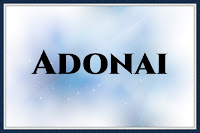Based on the assumption that the original Hebrew forms are what they call “pictographs”, some have claimed that ADONAI means, “The door of life”. However, the whole idea of giving Hebrew letters meanings as “pictographs” is actually a modern conjecture. There is no indication that the Bible writers ever thought of the Hebrew letters as being what is being labeled as “pictographs”. The Bible surely gives no indication that ADONAI means “the door of life”.
Some have claimed that in a few instances, the Masoretes were in error, as in Isaiah 6:1, where they added the vowel point to form ADONAI rather than presenting it to as “my lord” (ADONI). Some trinitarians, as well as some others, have claimed that they should have added the vowel point in Psalm 110:1, which would make it appear that both Jehovah and the one sitting at the right hand of Jehovah are both the Supreme Lord. The only reason, however, we can see for adding the vowel point in Psalm 110:1 would be to make it appear to be speaking of the doctrines of men that claim that Jesus is Jehovah.
Some present ADONAI as being one of the “names of God”. The form, ADONAI, as actually used in the Masoretic text, is not presented as being a name of God, although one could say it is a “name” in the sense that one could say that “tree” or “man” is a name. Or, one could say it is a “titular” name; however, it is not used as the proper name of God.
However, the Jews, became somewhat superstitious about pronouncing the Holy Name, and believed that it was too holy to be pronounced. By tradition, they began to use a form of ADON, or some other word, in place of the Holy Name. Oddly, the purpose given is that this avoids pronouncing the Holy Name. Actually, this would have them pronouncing (or mispronouncing) the Holy Name as ADONAI (or whatever form they may have used).* Jehovah, however, has never authorized anyone to change his Holy Name to another word as this is typically done.
====
*Thus, it is quite probable that some form of ADONAI was spoken, at least in replacing the Holy Name, before the Masoretes performed their work, around 500 AD.
Entry For Strong's #136 (Studylight)

No comments:
Post a Comment